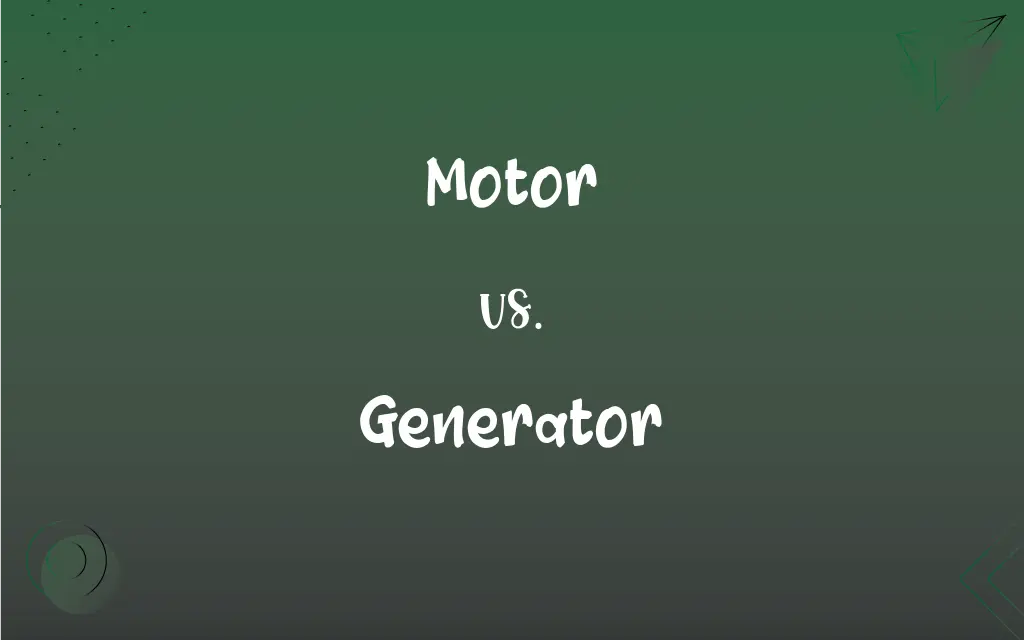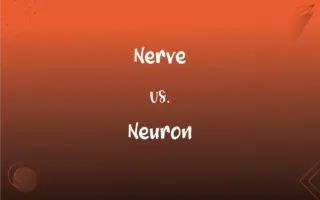Motor vs. Generator: What's the Difference?
Edited by Janet White || By Harlon Moss || Updated on October 26, 2023
A motor converts electrical energy into mechanical energy for motion, while a generator converts mechanical energy into electrical energy for power.

Key Differences
A motor is a device designed to convert electrical energy into mechanical energy. This transformation allows machines and appliances to move or function. On the other hand, a generator works in the reverse manner, converting mechanical energy into electrical energy, providing power to various devices.
In practical applications, when you want something to move or operate, you'd typically use a motor. For instance, fans, washing machines, and cars use motors to function. Conversely, when there's a need to produce electricity, like during power outages, a generator comes into play.
The working principle of both machines is based on electromagnetic induction. In a motor, electric current flows through coils, creating a magnetic field that produces motion. In a generator, motion (often from an external mechanical source) causes coils to move within a magnetic field, generating electric current.
When considering energy efficiency, motors and generators both have losses, primarily due to resistance and friction. However, the purpose remains distinct: motors focus on creating motion, while generators prioritize producing electric power.
Both motor and generator designs can vary based on the intended application. Motors can be categorized into types like AC (Alternating Current) or DC (Direct Current) based on the electricity they utilize. Similarly, generators can be standalone units for backup power or large installations used in power plants.
ADVERTISEMENT
Comparison Chart
Primary Function
Converts electrical energy to mechanical energy.
Converts mechanical energy to electrical energy.
Usage Examples
Fans, cars, appliances.
Power plants, backup power sources.
Working Principle
Uses electric current to create a magnetic field which produces motion.
Uses motion (from an external source) within a magnetic field to generate electricity.
Main Types
AC (Alternating Current) and DC (Direct Current) motors.
Standalone units, large installations in power plants.
Desired Outcome
Produce motion.
Produce electric power.
ADVERTISEMENT
Motor and Generator Definitions
Motor
An instrument that brings about motion from electric input.
The robot's motor allows it to move its arms and legs.
Generator
A device that produces electricity from motion.
The wind turbine acts as a generator, producing power from the wind.
Motor
A device that converts electrical energy into motion.
The motor in the fan powers the rotating blades.
Generator
An apparatus converting kinetic energy to electric power.
The campsite had a backup generator for emergency situations.
Motor
An apparatus that creates mechanical movement from electrical power.
The car's motor started humming as I turned the key.
Generator
A machine that converts mechanical energy into electrical energy.
We used a generator during the blackout to power our appliances.
Motor
A machine driving mechanical energy from electricity.
The conveyor belt uses a small motor to move items along.
Generator
A unit that provides electrical energy from mechanical sources.
During the hurricane, everyone in the neighborhood relied on their generator.
Motor
A contraption that uses electricity to produce kinetic energy.
The motor in the toy car makes it zoom across the floor.
Generator
A mechanism transforming movement into electrical output.
The hydroelectric dam uses a massive generator to supply the city with electricity.
Motor
Something, such as a machine or an engine, that produces or imparts motion.
Generator
One that generates, especially a machine that converts mechanical energy into electrical energy.
FAQs
What is a motor?
A motor is a device that converts electrical energy into mechanical energy to produce motion.
What is a generator?
A generator is a device that converts mechanical energy into electrical energy to provide power.
How does a motor work in a car?
A car's motor (or engine) converts fuel energy or electrical energy into mechanical energy, propelling the car forward.
Can a motor be used as a generator?
In principle, many types of motors can be used as generators and vice versa, but they're optimized for their primary functions.
Is an engine the same as a motor?
In some contexts, "engine" refers to a combustion engine while "motor" denotes an electric device, but "motor" can also refer to engines in contexts like "motor vehicle".
Can generators produce power for a whole city?
Large-scale generators in power plants can produce electricity for entire cities or even multiple cities.
Do motors need electricity to run?
Yes, motors require an electrical input to produce mechanical movement.
Why do motors heat up?
Motors heat up due to electrical resistance and friction among other factors.
Which is largerotor or generator?
Size varies based on design and application. Both motors and generators can range from tiny to massive.
Which is more efficientotor or generator?
Efficiency varies based on design and application, but both motors and generators can be optimized for high efficiency in their roles.
How long can a generator run continuously?
It depends on the generator's design and fuel capacity. Some can run for hours, while others can operate for days with adequate fuel.
Are there battery-powered motors?
Yes, many devices, like electric cars and toys, utilize battery-powered motors.
How is a solar generator different from a fuel generator?
A solar generator captures sunlight and converts it to electricity, while a fuel generator burns fuel to produce power.
How do wind turbines relate to generators?
Wind turbines utilize the wind to turn blades, which then drive a generator to produce electricity.
Why do motors vibrate?
Motors can vibrate due to various reasons, including imbalances, misalignments, or wear and tear of components.
What powers a generator?
Generators can be powered by various means, including gasoline, diesel, wind, water, or solar energy.
Do all motors run on AC power?
No, motors can run on either AC (Alternating Current) or DC (Direct Current).
Why do generators make noise?
Generators make noise mainly due to the combustion process in fuel-powered types and the mechanical components involved.
Can generators run indefinitely?
No, generators have limits based on fuel supply, maintenance needs, and component wear.
Can a generator charge a battery?
Yes, generators can charge batteries using the right setup and voltage regulation.
About Author
Written by
Harlon MossHarlon is a seasoned quality moderator and accomplished content writer for Difference Wiki. An alumnus of the prestigious University of California, he earned his degree in Computer Science. Leveraging his academic background, Harlon brings a meticulous and informed perspective to his work, ensuring content accuracy and excellence.
Edited by
Janet WhiteJanet White has been an esteemed writer and blogger for Difference Wiki. Holding a Master's degree in Science and Medical Journalism from the prestigious Boston University, she has consistently demonstrated her expertise and passion for her field. When she's not immersed in her work, Janet relishes her time exercising, delving into a good book, and cherishing moments with friends and family.































































